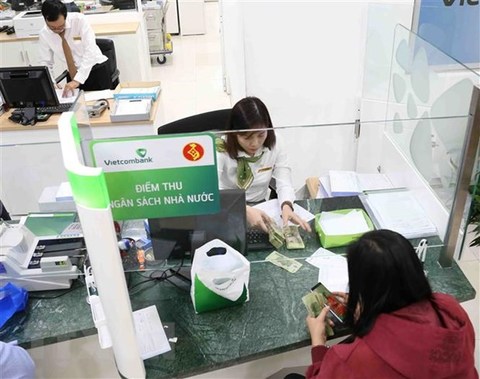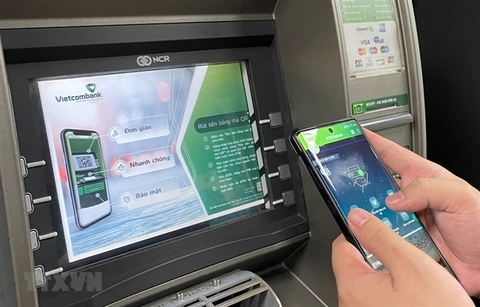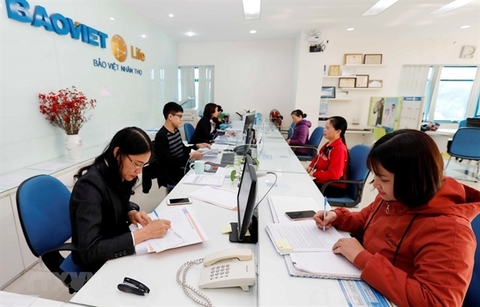The Ministry of Finance has announced the outstanding achievements of the financial sector in 2022, which contributed significantly to promoting post-pandemic socio-economic development.
Unprecedented policies

Products shipped for export at Hoa Phat - Dung Quat Port. — VNA/VNS Photo Duc Dung
In early 2022, the Ministry of Finance implemented proactively and timely policies to respond to the impact of the COVID-19 pandemic and to spur the socio-economic recovery and development programme in the National Assembly’s Resolution No. 43/2022/QH15 dated on January 11, 2022, with a number of fiscal and monetary support packages. Fiscal policy was the main focus, accounting for 83 per cent of the support package’s value.
Tax support included a reduction of 2 per cent in value added tax to promote production and consumption with total value of VND51.4 trillion, an extension of the tax and land fee payment deadline worth VND135 trillion.
These policies helped control inflation below 4 per cent while the inflationary risk was high in the global market.
It was estimated around VND233.5 trillion worth in tax and land fee support was provided in 2022.
Targets fulfilled

Budget revenue reached VND1.69 quadrillion, 19.8 per cent higher than the plan. — VNA/VNS Photo Vu Sinh
Despite increasing global uncertainties, the Ministry of Finance successfully fulfilled finance and State budget targets set for this year.
As of December 15, budget revenue reached VND1.69 quadrillion, 19.8 per cent higher than the plan.
Taking lead in digital transformation

The Ministry of Finance took drastic actions to promote the digital transformation progress. — VNA/VNS Photo
For many years, the Ministry of Finance pioneered the application of information technology to increase efficiency and transparency in financial management towards an advanced, modern digital finance to effectively serve the digital economy.
According to the Government’s administrative reform steering committee in May, the Ministry of Finance continued to hold the second position out of 17 ministries and ministerial-level agencies in terms of administrative reform index (91.9 points out of 100). This is the eighth consecutive year the ministry was in the top three ministries in the public administration reform index (PAR Index).
The Ministry of Finance also ranked first in digital transformation in 2021 among ministries which supplied public services.
E-invoice applied nationwide

E-invoices were implemented nationwide ahead of deadline. — Photo vneconomy.vn
The target of implementing e-invoices across the country finished two months ahead of the deadline, contributing to accelerating the process of digital transformation and modernization of tax administration.
To date, 100 per cent of enterprises which used invoices switched to e-invoices and 100 per cent of business households and individuals which used the declaration method registered and switched to e-invoices. An estimated 2.1 billion e-invoices were issued. The successful implementation of e-invoices contributed to boosting administrative reforms, creating a transparent business environment and promoting the development of e-commerce.
National finance system sustained

The Financial Strategy to 2030 contributed to creating the foundation for building a sustainable, modern and integrated national financial system. — File Photo
In March 21, the Prime Minister approved the Financial Strategy to 2030 which provides guidelines for all activities of the financial industry and contributes to creating the foundation for building a sustainable, modern and integrated national financial system.
Under the strategy, the collection for the State budget would not be lower than 16 per cent of gross domestic product in the 2021-25 period and 16-17 per cent in the 2026-30 period. Domestic collection would account for 85-86 per cent by 2025 and 86-87 per cent by 2030 of the total budget revenue.
Securities market development ensured

The Ministry of Finance continued to improve the legal and policy framework in order to develop a safe, transparent, efficient and sustainable stock market. — Photo vneconomy.vn
The stock market saw significant fluctuations in 2022, which affected investor sentiment. The Ministry of Finance continued to improve the legal and policy framework in order to develop a safe, transparent, efficient and sustainable stock market; and contribute to ensuring macro-economic stability.
The Ministry of Finance also asked the State Securities Commission to strengthen the management of securities organisations and corporate bond issuance, and tighten supervision and strictly handle manipulation actions to ensure transparent and sustainable development of the stock market.
Credit rating improved

Many organisations raised the credit rating of Viet Nam. — File Photo
Viet Nam’s budget disclosure and transparency score continued to improve from the previous evaluation, making Viet Nam 68 out of 120 countries, up nine places compared to 2019 and 23 compared to 2017.
It could be said that Viet Nam’s national credit rating has never been as good as it is today.
Moody’s upgraded Viet Nam’s credit rating from Ba3 to Ba2 with a stable outlook. S&P raised its rating to BB+ with a stable outlook. Fitch gave a BB rating with a positive outlook.
Viet Nam was among a few countries in the Asia-Pacific region and worldwide that saw its credit rating upgraded since the beginning of this year.
In the context that many countries had their credit ratings downgraded with lowered prospects, the fact that Viet Nam’s credit rating continued to be upgraded demonstrated the appreciation of the international community for its effort to recover the economy from the pandemic, grow strongly and become a spotlight of the region.
Moody’s also upgraded the credit ratings of 12 Vietnamese banks.
Inflation controlled effectively

Inflation was kept below 4 per cent. — VNA/VNS Photo
The Russia – Ukraine conflict and global supply chain disruption caused energy and food prices to skyrocket and made inflation a common story in many countries. In many major economies, inflation reached the highest level in 40 years.
In that context, Viet Nam effectively controlled inflation below 4 per cent as set by the National Assembly and the Government, helping businesses to recover production and promote economic growth.
Trade revenue making record

Hai Phong Port. — VNA/VNS Photo Tran Viet
Viet Nam’s total import and export turnover touched a record high of US$700 billion this year, an impressive result in the country’s post-pandemic socio-economic recovery.
Customs continued to implement a number of solutions to facilitate trade in the context that many new difficulties emerged, together with the efforts of institutional reform and simplification of administrative procedures and the implementation of the National Single Window and the ASEAN Single Window systems.
Law on Insurance Business passed

The Law on Insurance Business was expected to promote the development of the insurance market. — VNA/VNS Photo Tran Viet
The National Assembly on June 16 passed the Law on Insurance Business which will be put into force from the beginning of 2023. The law was expected to promote the development of the insurance market in both size and quality. — VNS